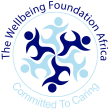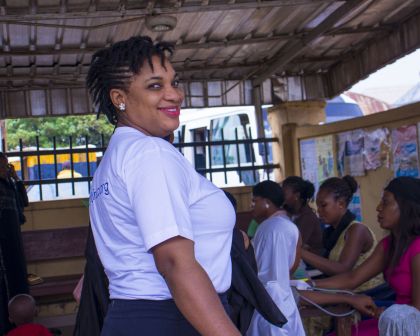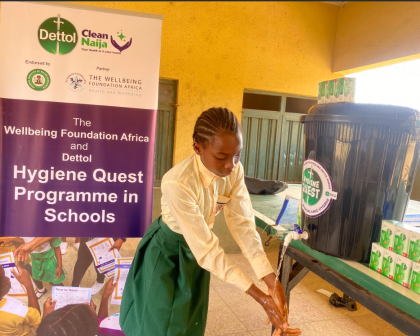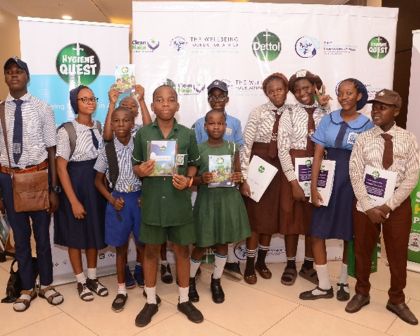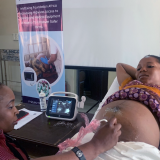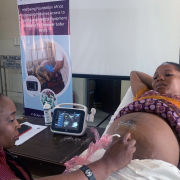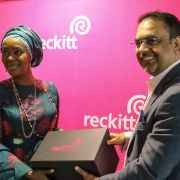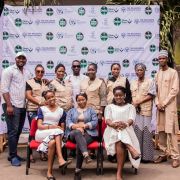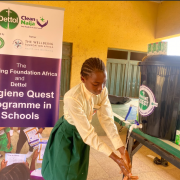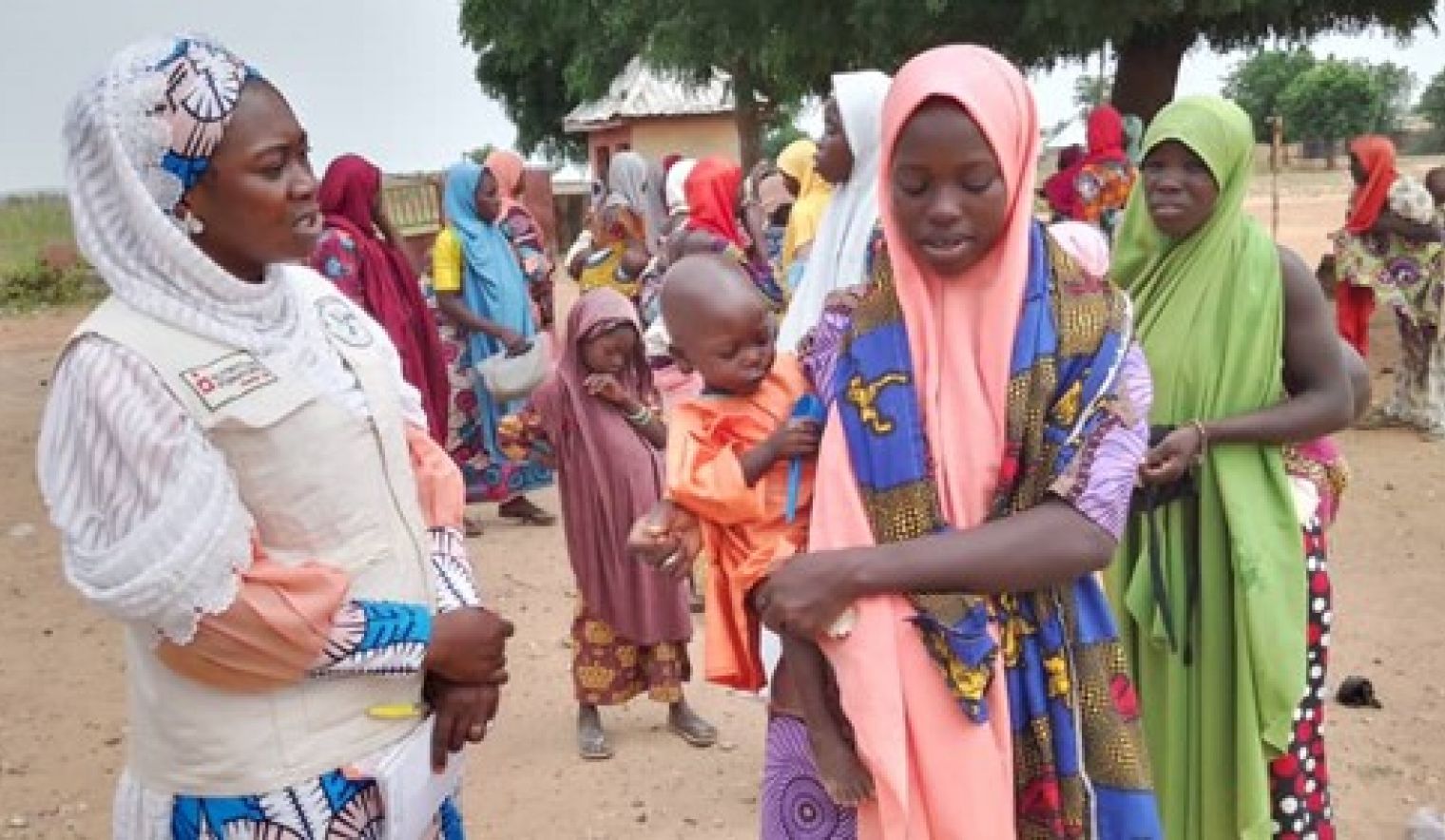
Unveiling Inspiring Success Stories from the Zinc-LOORS Program
The Zinc-LOORS Program, a remarkable initiative spearheaded by the Nutrition International and Wellbeing Foundation Africa, funded by the Canadian government, in Sokoto and Kano States has been making significant strides in promoting health and wellbeing within communities. This program has not only focused on bridging knowledge gaps, combating diarrhoea, and improving hygiene practices but has also left a lasting impact on the lives of many children under 5 years of age.
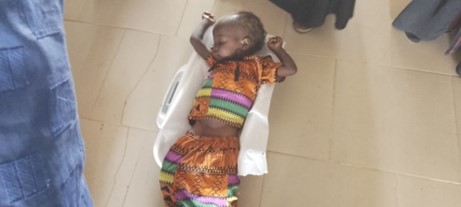
Maryam when she was first brought to the hospital
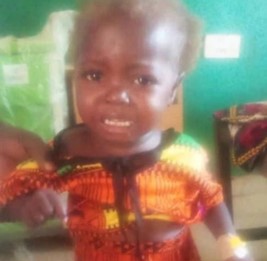
Maryam fully recovered
One of the extraordinary success stories from the Zinc-LOORS Program revolves around combating malnutrition in vulnerable communities. Through targeted interventions and support, the program has witnessed remarkable improvements in the health and development of children.
Maryam, a malnourished and dehydrated 2-year-old girl, was brought to a health center where her condition was assessed by a trained health worker. Due to the severity of her weight loss, Maryam's parents were advised that she needed to be admitted to the hospital. She received the first dose of Zinc/Lo-ORS under the supervision of her mother, who was also taught how to administer it.
After two weeks of ongoing evaluation and therapy, Maryam showed significant improvement. Her weight increased to 7.8kg, and her mid-upper arm circumference improved to 12.5cm. The use of Zinc/Lo-ORS and the care provided by skilled healthcare professionals contributed to her recovery.
A Nutrition International and Wellbeing Foundation Africa midwife followed up on Maryam's progress. The midwife emphasized the importance of good hygiene practices at home and provided guidance on proper infant and small child feeding techniques to Maryam’s mother.
Another aspect central to the program's success is its emphasis on hygiene practices and the importance of Water, Sanitation, and Hygiene (WASH). By implementing robust hygiene education programs the Zinc-LoORS Program has effectively reduced diarrhoea cases across communities.
Abdullahi, a two-year-old boy, was part of the Wellbeing Foundation Africa and Nutrition International program aimed at improving childhood diarrhoea treatment in Northern Nigeria. His illness began with a fever and progressed to increased stooling frequency. Initially, Abdullahi stooled once a day, but it progressed to three times daily within the first week.
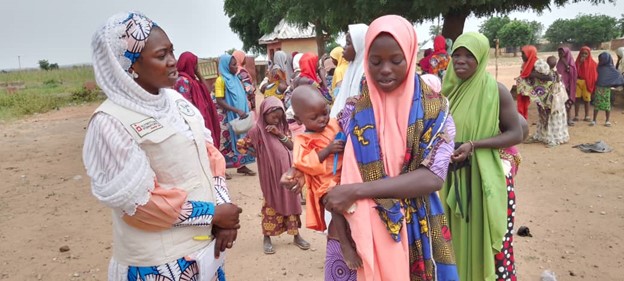
The Wellbeing Foundation Africa and Nutrition International midwife counselling Hauwa on the importance of WASH practices
In an attempt to treat him, Abdullahi's mother, Hauwa, administered herbs. However, Abdullahi's condition worsened as he started experiencing sleep disturbances and midnight stooling. After three weeks, Hauwa noticed that Abdullahi had lost weight and decided to take him to the Zamau primary health center. Upon arrival, Abdullahi was dehydrated and crying.
At the health center, a health worker conducted a diagnostic assessment, confirming Abdullahi's diagnosis of diarrhoea. During the examination, the health worker inquired about Hauwa's hygiene practices at home and discovered deficiencies in household hygiene and meal preparation.
A Wellbeing Foundation Africa and Nutrition International midwife counseled Hauwa on the importance of WASH practices and their impact on overall well-being. The midwife emphasized the need for proper hygiene routines, including thorough utensil washing and ensuring meals were adequately cooked.
After the first dose of Zinc/LOORS was administered to Abdullahi in Hauwa's presence, she received instructions on how to continue administering the treatment. The WBFA/NI midwife also advised Hauwa to return for further monitoring of Abdullahi's progress.
Abdullahi's story exemplifies the positive impact of the Wellbeing Foundation Africa and Nutrition International's initiative in improving childhood diarrhoea treatment. Through counseling and education on WASH practices, Hauwa gained valuable knowledge to support Abdullahi's recovery and prevent future incidents of diarrhoea.
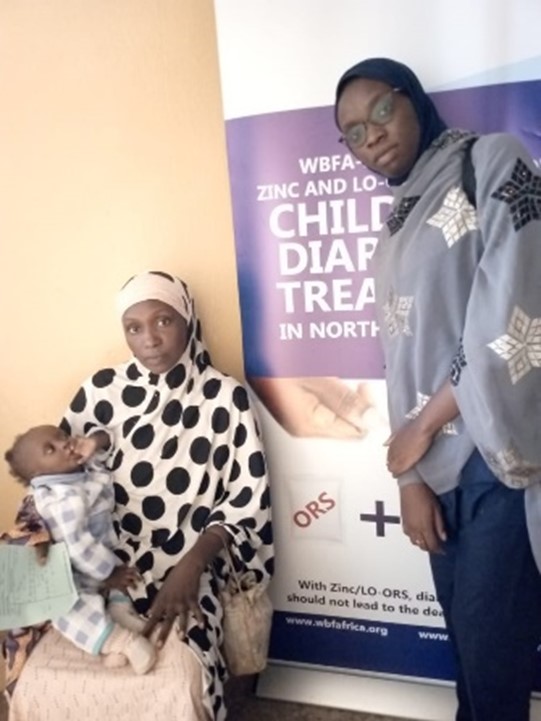
Halima and her mother when she was first brought to the hospital
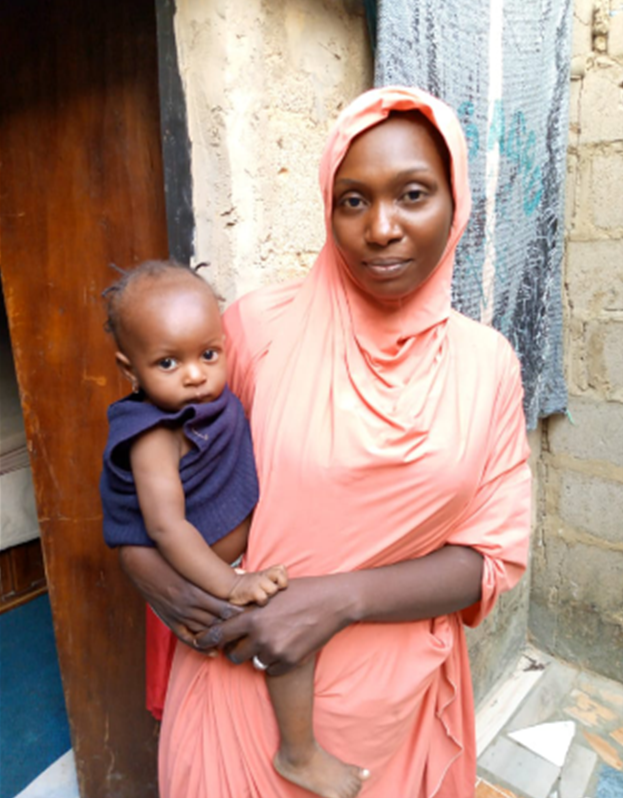
Halima at home, fully recovered
Hygiene plays a critical role in preventing the spread of diarrhoeal diseases. Simple actions such as handwashing with soap, proper sanitation, and safe water practices can significantly reduce the risk of infection. The Zinc-LoORS Program has placed a strong emphasis on promoting hygiene practices within communities, empowering mothers and caregivers with the knowledge and tools to maintain proper hygiene.
Halima, a nine-month-old infant from Kano state, Nigeria, experienced severe diarrhea after consuming a meal of Bread, Towon masara (a local corn flour dish), and Okro soup. Concerned for her well-being, her mother, Mrs. Ibrahim, attempted to treat her with Oral Rehydration Solution (ORS) but Halima's condition worsened, prompting her mother to seek help at the Kabuga Primary Healthcare Center.
Upon arrival, it was evident that Halima was dehydrated, exhibited weak pulses, dry skin, rapid breathing, loss of appetite, and weight loss. The healthcare team quickly admitted her to the Emergency Unit for urgent medical attention. During a routine visit by the Wellbeing Foundation Africa (WBFA) team, Midwife Ithaf recommended administering Zinc and Lo-ORS to Halima.
Thanks to the prompt intervention and care from the skilled healthcare workers, Halima's condition showed significant improvement within 24 hours of receiving Zinc and Lo-ORS. Her health and weight started to improve, bringing relief to her worried family.
During a follow-up visit, the WBFA team found Halima happily playing with other children in her family compound. Her mother received counseling on the prevention and causes of diarrhea and the importance of personal and environmental hygiene, with a particular emphasis on handwashing.
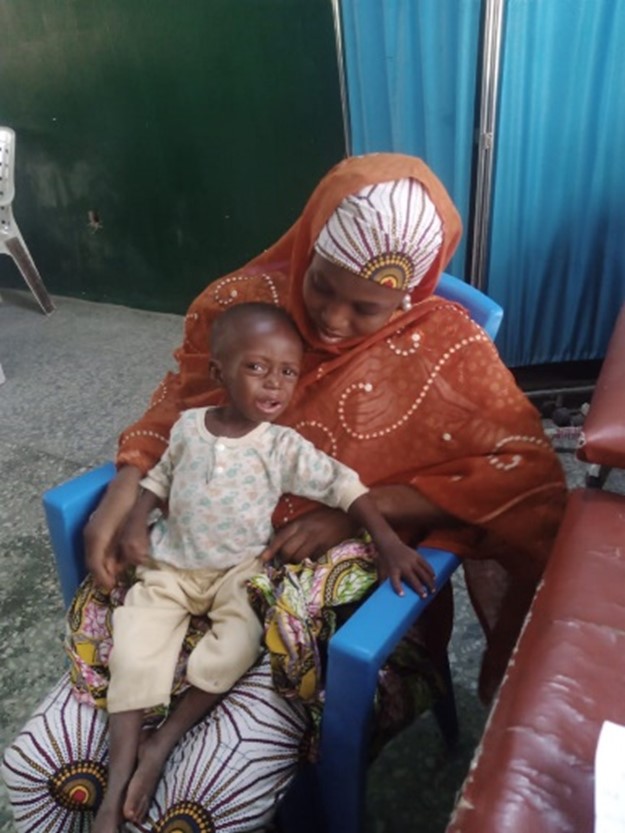
Yakubu when he was first brought to the hospital
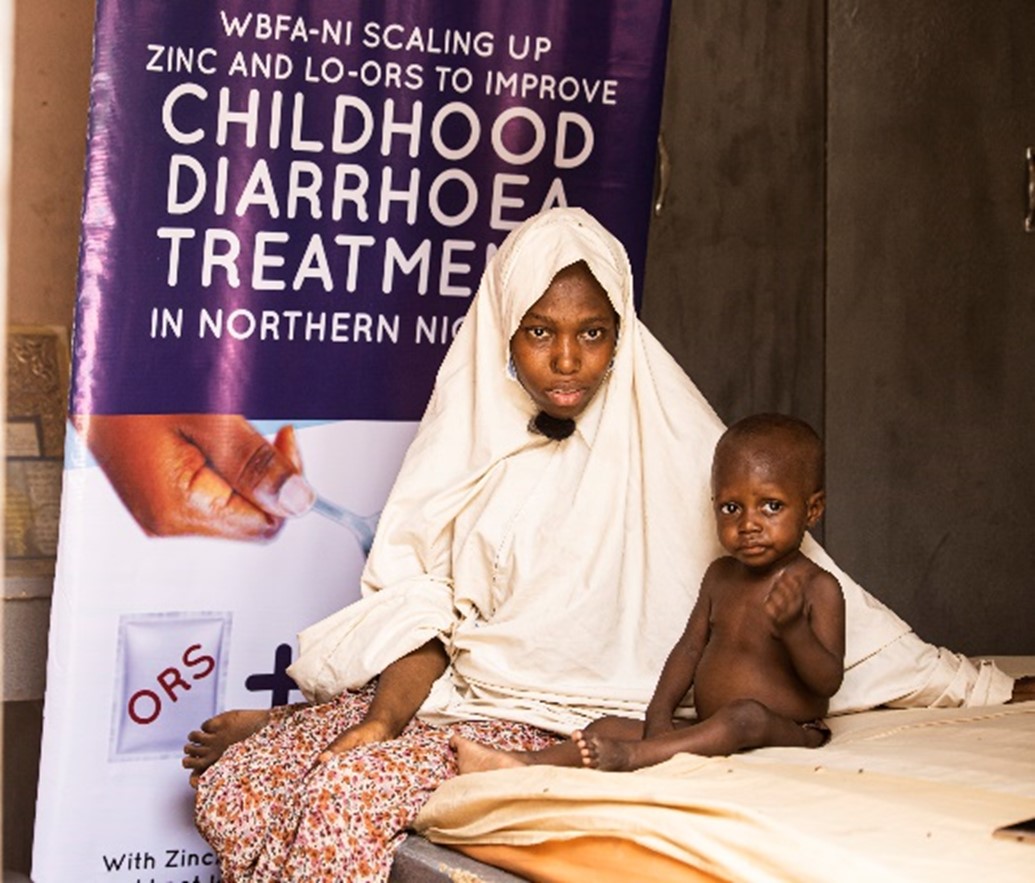
Halima at home, fully recovered
Bridging knowledge gaps has been a fundamental aspect of the Zinc-LoORS Program. By collaborating with local healthcare professionals, community leaders, and caregivers, the program has established a comprehensive framework for knowledge sharing and capacity building.
Bashir Yakubu, a two-year-old child, suffered from diarrhoea for three days before his mother brought him to the hospital. Unaware that Zinc and LOORS were the recommended first-line treatment for childhood diarrhoea, his mother had been treating him with antibiotics and ORS.
Upon admission to the hospital, Bashir started receiving Zinc LOORS treatment immediately. His mother received instructions on how to administer Zinc LOORS at home, including the correct dosage.
Remarkably, within 24 hours of the first hospitalization and the initiation of Zinc LOORS treatment, Bashir's diarrhoea ceased. Since receiving Zinc LOORS treatment, Bashir has not experienced any further episodes of diarrhoea.
Rashida, Bashir's mother, has become an advocate for Zinc LOORS. She actively informs mothers in her community about the importance of using Zinc LOORS as the first line of treatment for childhood diarrhoea. Rashida goes the extra mile by showing the co-pack and explaining the correct dosage to other mothers, following the guidance provided by the Wellbeing Foundation Africa and Nutrition International midwife at the hospital. Her efforts aim to raise awareness and promote the use of Zinc LOORS for effective management of childhood diarrhoea.
Share this Article
